Itching to create and share your games, zines or any content? 1 year ago, I wrote a French "101 itchio tutorial" blogpost (there; I also wrote an "analysis" I'll translate soon too). I wrote it especially for tabletop roleplaying games (TTRPGs) designers. Well, there it is now in English. Even if it's easier for you to understand this website, you could find some tips in it –I hope so.
Please tell me if you find this useful and i'll make a zine or at least a 'visual version' of this tutorial.
Click to open each "chapter":
This was a summary of FAQ page, read all details on itch.io/docs/creators/faq
Brief list of itchio main features:
Collections are lists you create as you wish. You can list other people's games and projects, as well as your own projects.
A collection allows you to:
You'll find collectins in your 'My library' section, by clicking on the arrow next to your name (top right of your window browser – or direct link there: itch.io/my-collections).
When you create a new account, you automatically have 2 'basic' collections to begin with: 'Things you've rated' and 'My Purchases' (either you donated money or obtained with a 'Reward' function).
You can rearrange the projects included in a collection, by clicking on the title of a collection to open the list, then hover your mouse over a game and click on Move left or right.
You can use itchio without upload anything. You can choose to only use it as a digital library to discover and organize games and content you like.
If you want to upload your own creations, here's the process:
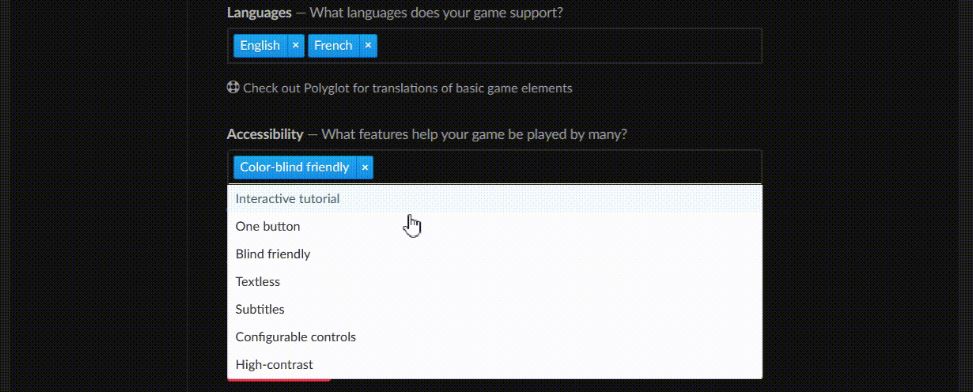
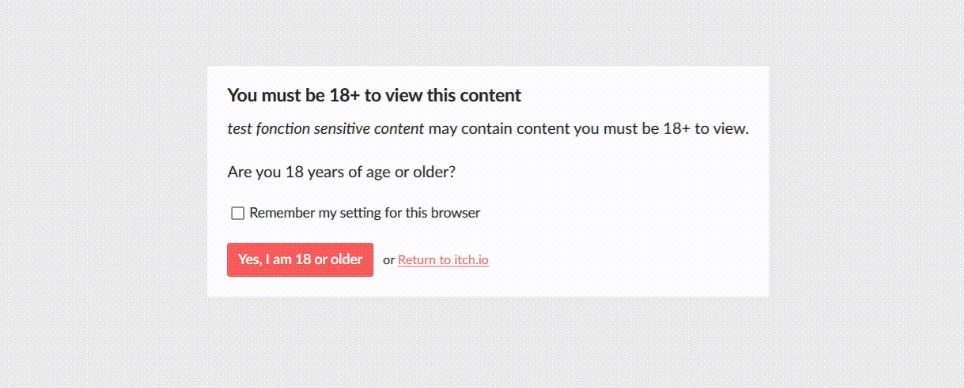
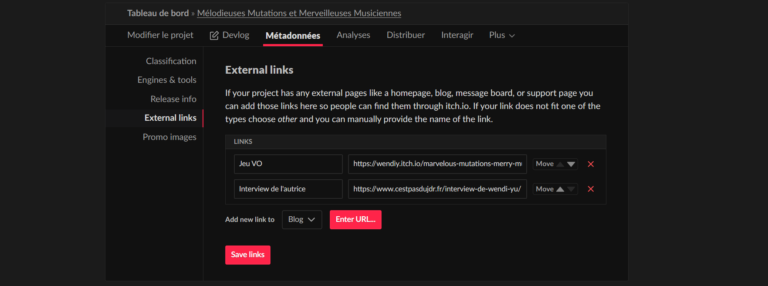
To upload paid or pay-what-you-want content, you must first be able to legally receive money and fill in the "tax interview" form (Settings>Tax information). This form only needs to be completed once (every 3 years), it then allows you to upload as many paid projects as you like.
Note that you shouldn't expect to receive huge sums of money when you publish on itchio (or when you publish TTRPGs at all, for that matter), let's just say it's a political stance rather than a lucrative business; I talked about this in my other blogpost I'll soon translate too. Indeed, many people post paid projects online, but provide free access to them.
If you're considering paid or free content, think about the percentage you want to leave to the platform. Other websites take around 30%, but itchio gives you total freedom to decide what you want to give it. The default is 10%. You can manage this in your Settings > Revenue sharing. You can therefore set to 0% what you give to itchio, if you don't want to support this website (either permanently or temporarily, as you can change this percentage at any time); but note that there are fees you can't avoid and are not due to itchio, such as payment service fees: i therefore recommend you to sell at prices higher than $2 (sales under $2 are taxed by PayPal etc. at higher percentages).
Using the 'Direct to you' mode, you'll be able to set your prices in your country's currency but you may have more paperwork and unforeseen to deal with. I'm not an expert but I would advise you to choose this only if you have time and energy to manage it.
Using the 'Collected by itchio, paid later' mode seems to be the simplest, in my opinion. It has the inconvenience of displaying your projects in American Dollars ($US), no choice. That's what I've chosen and have no issue; but number of people seem to report no issues on the other option.
You can check details on itch.io/docs/creators/payments#payment-modes.
When uploading a paid project, you can provide free option. Whether it's a demo/reduced content or the full game, you'll often see itchio autors doing that.
You can provide free files using:
How: Go to Dashboard > Edit game > upload your free file and check "This file is a demo and can be downloaded for free"
What: Only this file will be free (your project needs to be a Priced project)
Displayed text: the free file will be displayed in a "Download demo" new part of your page, you can't change this title and no text can be added to this area.
Download button text: "Download"
Collections' library: the file is a direct download, it doesn't register in the library.
How: Go to Dashboard > Edit game > upload your paid file and check "Set a different price for this file"
What: Only this file will be priced (your project needs to be a Pay-what-you-want project)
Displayed text: the priced file will be displayed in the "Download" section –a price will simply appear below it, and the default price when people click on "Download" becomes the price of the priced file, but people can dowload the other files for free (by entering a lower amount or clicking on "No thanks").
Download button text: "Download"
Collections' library: if the person buys, the project enters their library in "My purchases". If they click on "No thanks" to only get the free files, the project doesn't enter their library.
How: Go to Dashboard > Edit game > More > Rewards: there you can add different prices for your whole project page, and thus free if you write $0 as the minimum price. Click on 'New Reward', fill in title, description, price, quantity then click on 'Save.'
What: This $0 Reward function provides free access to all current and future files of this project page. (Whether your project is paid, free or open-price).
Displayed text: You can add any title you like, both for the Rewards section (in the example shown here, I've replaced it with a star) and for the title of the first "reward" (in this case, a candle emoji). You can do this by replacing the titles with emoticons or by matching their color to the page background, but don't forget to remain accessible, i.e. to clearly mention what it is even if there is no title (I always mention it at the top of the page in addition to specifying it in the description, for example).
Download button text: "Claim access"
Collections' library: project goes into the downloader's library, in the " My purchases " category (even if it's free access).
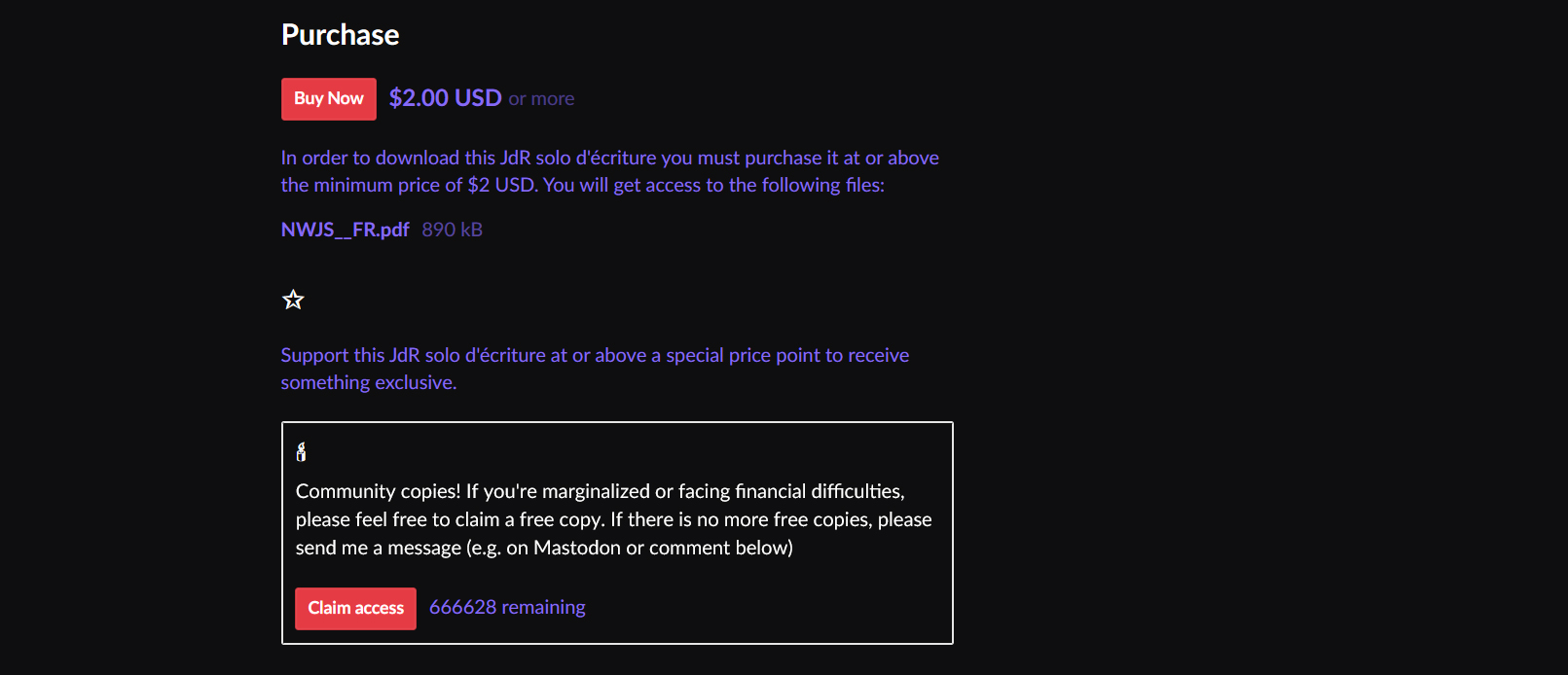
Here's a behind-the-scenes look at the above example, with symbols instead of titles and a price of $0 for hundreds of thousands of copies:
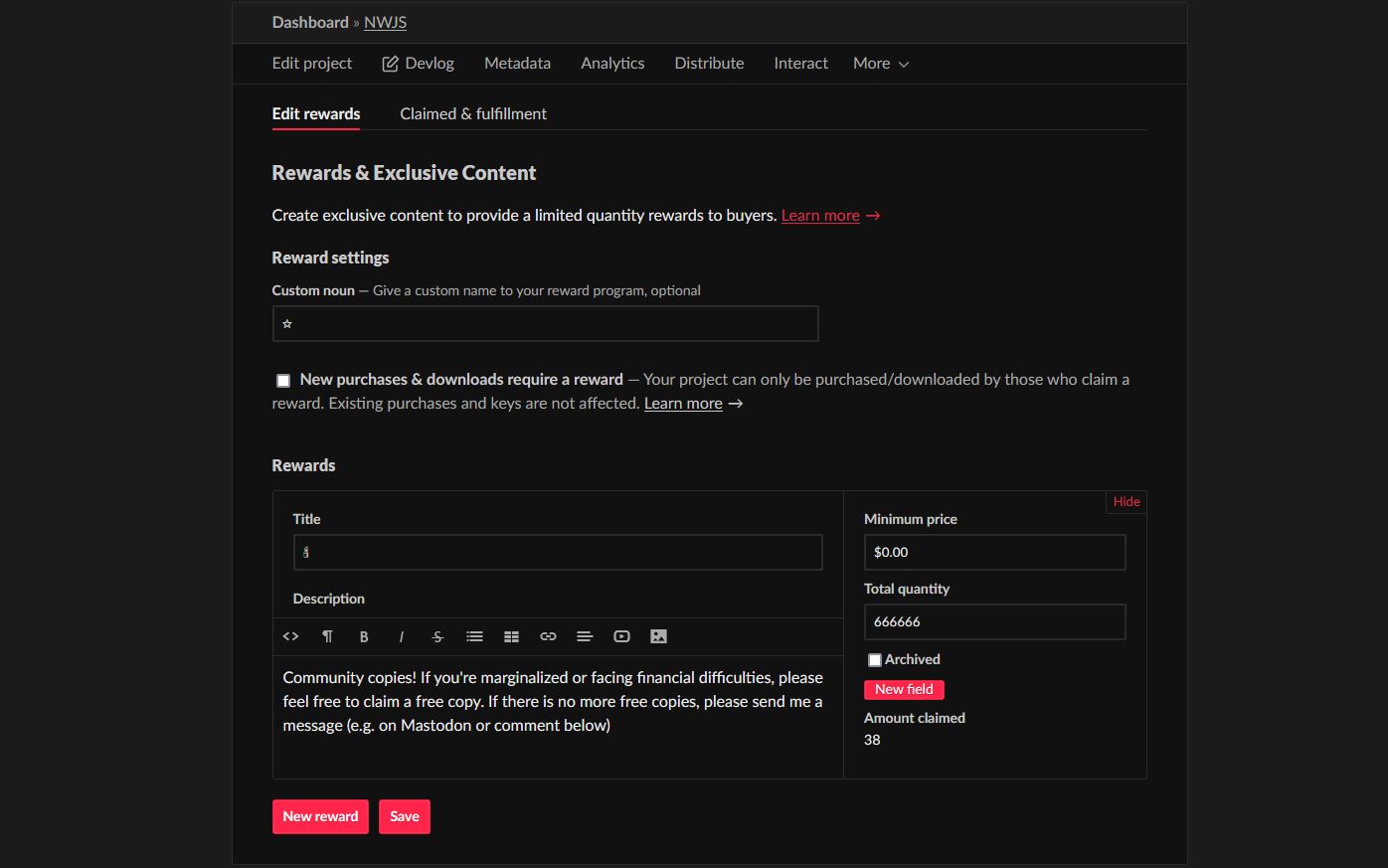
Be careful, you won't get any alert when no more free copies are available. It will simply display "All copies claimed!" instead of the download button. You can change the number of copies of a reward at any time, so you can add more copies indefinitely, but you have to do it manually.
Download Keys are also free access. But unlike the 3 features above, these are individual access codes to be given directly to the person you want to give your game to for free. You can use this feature to give away your games to your loved ones or other people (bloggers, etc.) or to provide digital rewards at events and prize draw, as keys are URL links that are not linked to any account until "used".
How: Dashboard > Edit game > Distribute > Download keys: you can create single keys ("Create download key") or a list of keys ("Create key group", which provides you a txt file containing a specific number of keys).
What: Each key gives free access to all current and future files of the project page.
Collections' library: The project is added to the downloader's library, in the "My purchases" category (even if it's free access).
In the same tab, you can see how many keys have been used, or even cancel them if you no longer wish a specific person to be granted access.
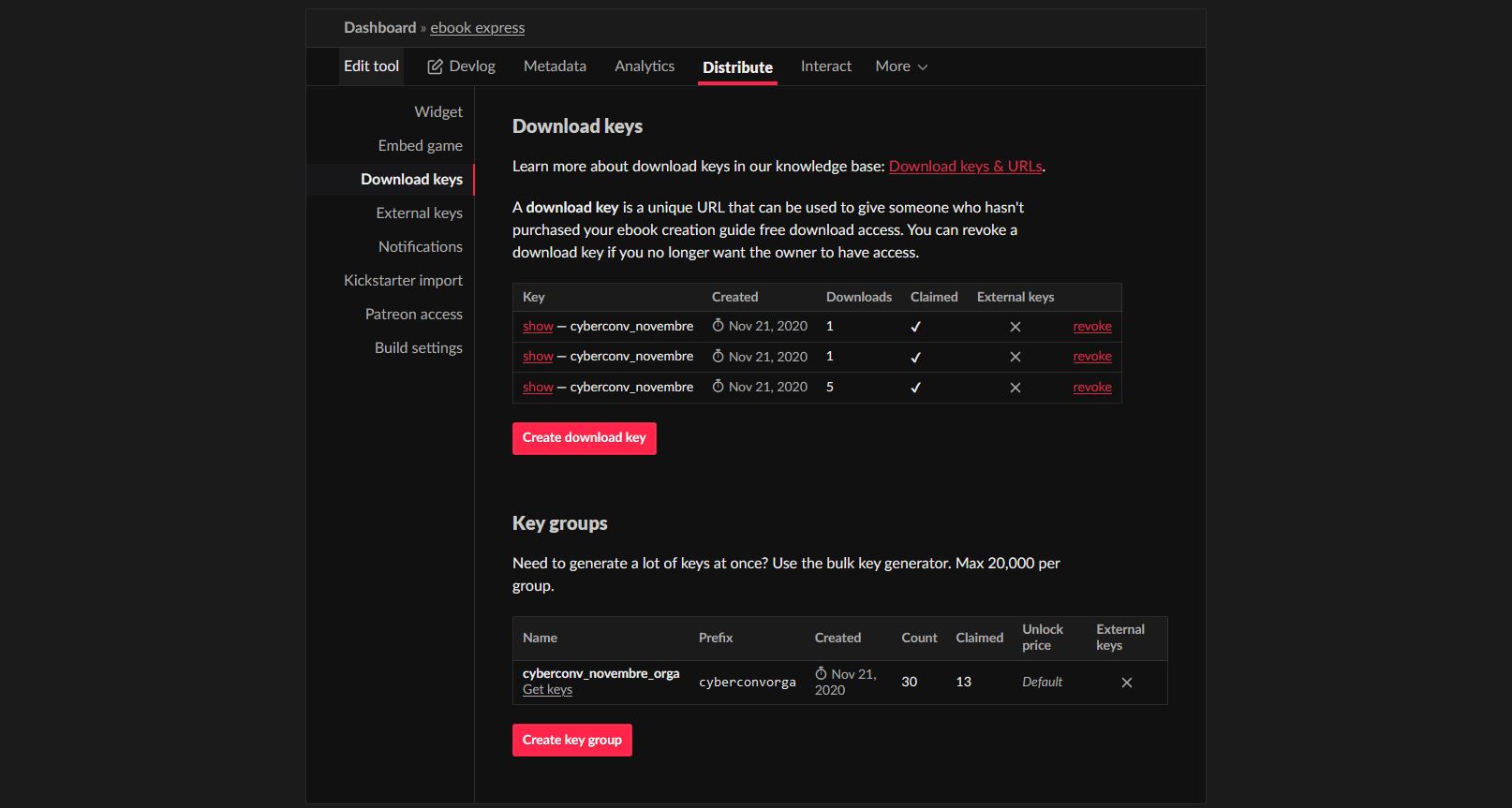
Each Key is a direct link to the download page and looks like this to the person using it:

Once uploaded, you can see how many people have viewed your project page and downloaded the file(s). You can look at how many downloads and purchases for all your games at a glance in the Dashboard > Analytics:
If you look at a month (or less) timeframe, the graph will be precise and you can hover over the vertical bars to see exactly which project has made how many views/downloads. If you choose a longer period (several months), the graph becomes less precise and simply shows you overall trends (the bars turn into a single curve/line).
Devlogs are pages whose link will appear just below the "Download" button and above the "Comments" section.
This feature exists because itchio was designed for the video game industry, in which it is common practice to write down the details of each update. So you can use this to present your project and talk about updates, but also about your creative process, your inspirations, references or whatever you like. You can type using titles, lists, bold, italics, images… It's like a small blog included in each of your project pages. Note that a new "blog post" function is currently being tested on itch.io (more on this in a future article if it catches on).
It's not essential to write devlogs, it all depends your creative practice, your habits and what you want to tell to people (your project page may be more than enough!).
You can find all your devlogs, across all games, in Dashboard > Posts (direct link itch.io/dashboard/posts) and write new ones from the same place (by clicking on "New devlog" > Name of your game) or directly from your game page.
You can rate projects. The rating is expressed in stars, 5 being the maximum, but I strongly recommend to not use this rating as you would on other websites, because it's highly punitive here for tabletop roleplaying games.
If you don't like a project, but it doesn't disgust you, don't rate it. If you rate it less than 5 stars, you're "sinking" it. (Yes, even 4 stars sinks the project –it's an algorithm problem and I'm not sure it's been fixed this year; perhaps because there aren't enough ratings on physical games as opposed to videogames).
According to Khelren:
A sole [negative] note has a strong impact, and it takes a lot to compensate for it. For 1 troll [who gives you only 1 star], you need a dozen 5-star ratings to compensate.
If you enjoy something, rate it 5 stars and speak out about it. What I recommend when you rate a project is to include a message with your rating, which you then copy and paste into the public Comments section of the page (as the text you can write under your rating will not be publicly visible and will not send any notification to the author, unlike comments).


When you add a project to a collection, you can insert a message that will be visible:
Comment on what you like. Let us know when you've enjoyed a game, a rule, a headline, a picture, or a play on words in a text. A brief comment of just a few words can be such a motivating and gratifying thing for an author! Especially in a small community like ours. Make it public so that other people are encouraged to leave a comment too, or will even reply to yours. Itchio is a website on which most of the people (TTRPG field, at least) are friendly: be part of it 🙂
Bonus tip: if you'd like to play the (algorithmic) "popularity" game, add a video as a comment to the projects you like. This brings the project up on the "Most popular physical games" page, and helps its author to be highlighted. This is an observation made and "studied" empirically by several people. The aim is not to comment with any video, but to comment with actual plays or any game-related content. I guess this is a function of the algorithm linked to itchio's purpose: a videogame platform, the most popular video games being the most streamed.
The website doesn't have a messaging system, so all exchanges with other creators take place publicly (in the Comments or Forum sections). There is a Community tab, which is a public forum, but it doesn't sound very popular (in the TTRPG communities).
For a more private conversation, you'll usually find a link to the author's personal website or social network on their profile page. If you need to send a more "private" message on itchio, you can comment on a game's devlog by leaving your email address and then deleting your comment once the author has replied or contacted you; I advise you to do this only if you truly can't find any way of contacting them but you really need to get in touch.
Some of your actions generate automatic e-mail notifications. Be reassured, these are generally not single e-mails, but rather e-mails grouping together several notifications at once.
You'll receive a single e-mail when someone :
You receive a " grouped " e-mail when someone you follow :
Single emails aren't always sent, and it can often happen that you don't get any email notifying you that someone is following you or has bought a game (especially if your account is logged in, itchio won't send you an email because you'll get the red notification). If, however, that's too many emails for you: you can deactivate some or all of these notifications in Settings > Email notifications.
Itchio was originally a videogames platform, so let's forgive the lack of certain options. But let's take a look at what we can do with what already exists, by hijacking existing functions:
(click to read more)
Above in this blog-post, I introduced you to Collections, the lists you create and manage yourself, to keep links to your favorite games in one place, for example. But you can also use these lists to sort your own creations when you come to have a large number of them. This is handy because, on your profile page, you can only add text to the header, and you can't really sort your creations (you can organize their order, show/hide them and… that's it. Except if you're a CSS dev but well, you don't need this tutorial therefore :).
It's easy:
The titles of your collections will be displayed above your creations, like category titles. You can also add a short descriptive line to collections, which will also be displayed on your profile page.
Thanks to the “Rewards” function I introduced earlier, you can use itchio as a light email newsletter tool. When you click on a “Claim access” button, your e-mail address linked to your itchio account is saved in the project parameters. The author can then send you an email directly from itchio.
Make sure your viewers understand you'll be using your page to send emails! Their consent is important, so make it clear that by clicking on the button they're signing up for an email newsletter! It's forbidden (and uncool) to use itchio's mailings to spam or annoy people.
Pros:
Cons:
Here are two examples of "itchio DIY newsletters": BasiliskOnline's Mailing List and my own former Solo DaNews test newsletter. Here's an overview of what you can get as a basic formatted newsletter:
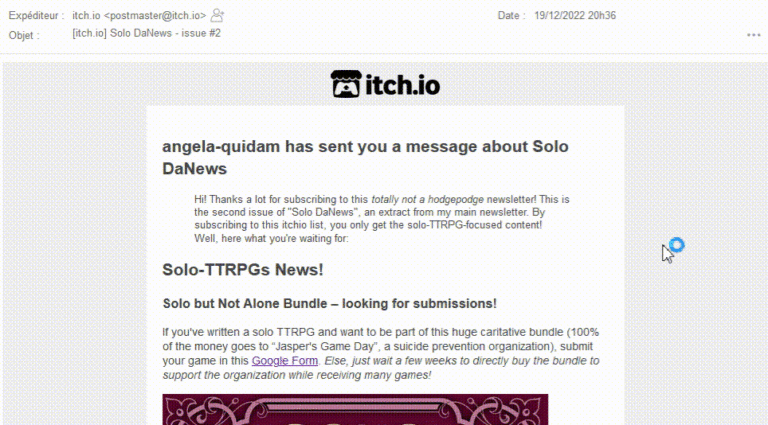
Glimpse behind the scenes:
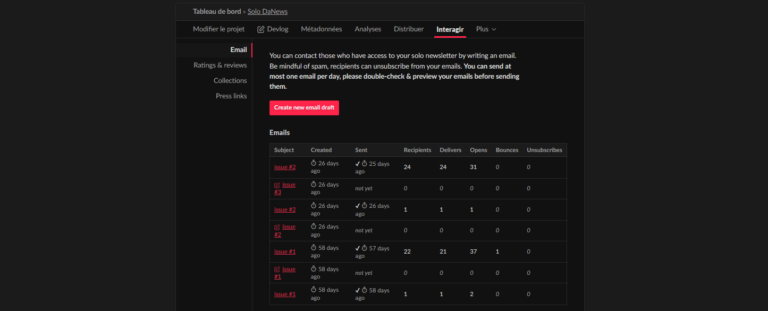
This is not a blogging platform but it can be used as one! By using devlogs as blog posts. This is what UnPlayableGames did, also providing a PDF version of each devlog/blogpost at unplayablegamesrpg.itch.io/upg-d-blog.
Thus, you can "blog" by simply creating a new project that you'll name Blog (or Potato, although your readers might find this hard to understand?) and then creating a new devlog each time you want to write a new "blog post"
Each new devlog will be featured in itchio's (collective) mails to your followers, but UnPlaybableGames has found a trick to get an RSS feed:
your-name.itch.io/page-title/devlog.rss
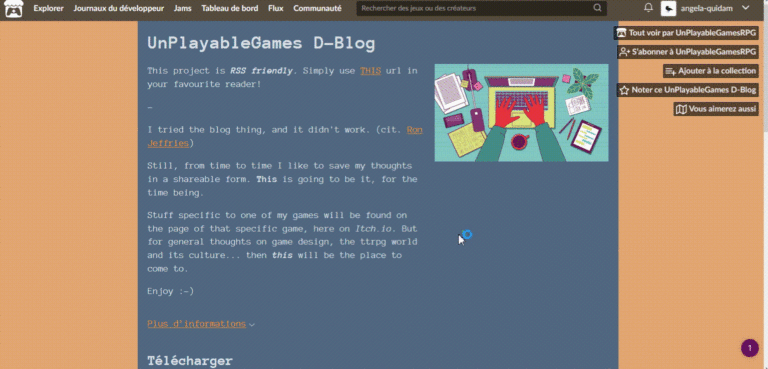
You've guessed it: we can hijack itchio as much as we like, since we can create pages of text… or pages of links. It's like your "Favorites" browser tab, but shared with the whole world, literally.
You can create your table of contents, showing all your creations, a list of your favorite resources, a list of authors to follow, your shopping list, or whatever you like.
You can display it:
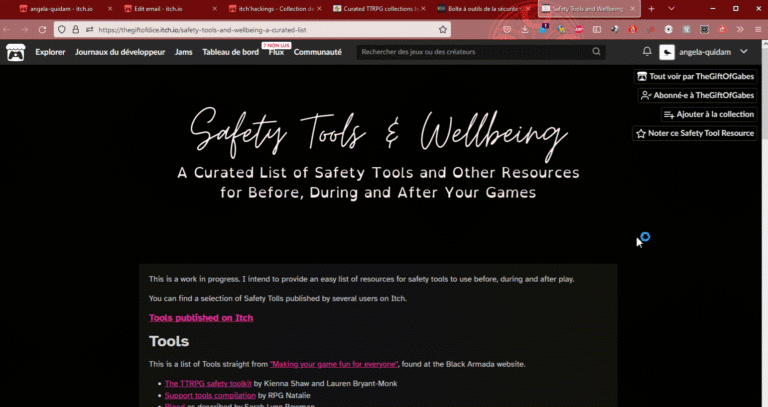
A press kit is a folder usually sent to the media, journalists or influencer before the launch of an event or project. It's a good idea to create one when you want to make an announcement or launch, for example.
Whatever shape it takes, it's a good idea to include all the key informations: title, description, calendar dates, credits, pictures, useful links... The aim is to provide all the information you need to publicize your project, so that other people will be able to promote it. Some teams do this before their TTRPG launch, often on tiny websites like carrd, but sometimes on itchio too, like IKO with its Skyrealms press kit.
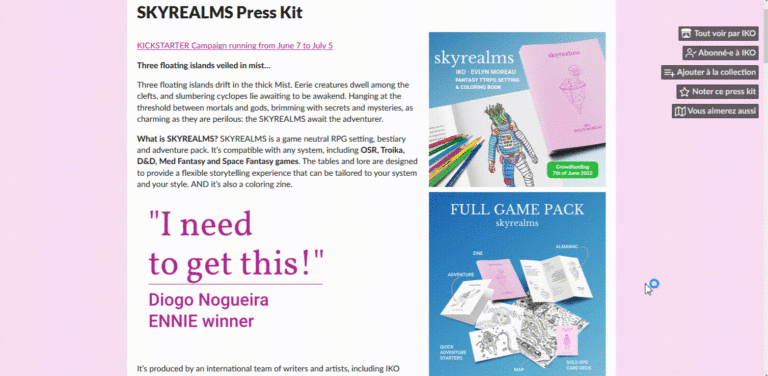
On itchio, you unfortunately can't make "shared income" on a single project, even if several people can be admins of the project (the page creator remains the one who will receive the money). On the other hand, you can share the money received on collective bundles, the bundle host choosing the percentage of income that will go to each contributor.
To share revenues on the same project, you can therefore upload a pretty expensive project and create a collective bundle with the "true price" (less expensive than the project alone). It's even a great opportunity for each participant to create a useful page such as a note of intent (like Nimaël did for I'm a Trans Man and I'm Here to Fuck) or even a whole portfolio (like Nicolas Folliot, who integrated his own website on a page called itchfolio).
The website is designed to sell or share digital products, but you can also use it to “sell services”. Simply by using itchio as a place to promote your services and receive money. For example, ask your readers to send you a message after each purchase (specifying their request), as Blinking Birch Games does for Playlist commissions or I do for Low-stress art commissions.
However, be sure to act in a legal way. You must be able to declare this income to your country's government. If you're not sure about receiving money on itchio without invoices etc., you can use itchio as a simple "showcase" and make money transactions elsewhere, as Gabriel C. does for GM services.
Without going (yet?) into too much detail, the itchio website lets you create sales, bundles and other temporary promotional events. Which is pretty cool, because you really get to control how you distribute and promote your creations.
From time to time, we see people trying out things with this sale function: for example, increased prices to highlight ideals or, on the contrary, a decreasing discount as the month progresses (on December calendars or as DIY crowdfunding) or when new files are being added… There are lots of ideas being experimented. Keep this in mind: it's a possibility you might want to try!
---
What are you looking for on itch? Do you still find the website mysterious? What have you seen that was fun, interesting or unpleasant? Do you participate in jams? Has itch enabled you to connect with authors? Have you already uploaded any projects, or are you thinking of doing so?
Thank you for reading this tutorial! I'll soon translate into English my other blogpost about my "itchio analysis". Be sure to stay updated by following me here on itchio or in my newsletter! (link in my itchio profile page)
Cheers,
dan
Did you like this post? Tell us
Leave a comment
Log in with your itch.io account to leave a comment.
I wonder if you set this up as an itch project page it would be better for folks to save it, since we could add it to collections then. Blogs unfortunately have no save feature on itch at the moment.
Excellent work anyway!
hi, thanks! Great idea. Making a ‘better’ version of it was planned if people wanted it: I didn’t receive a lot of messages about this tutorial but as there are already a lot of views, I guess it’s useful and shared therefore I’ll make a more readable and ‘visual’ version of it as a zine (on a itchio project page) 🙂
Yeah! Even a page with links to these posts is good enough I guess? Wellm I for one keep an eye on your stuff :)
Thanks! Waiting for a 'zine version' I'll take inspiration from your list pages :)